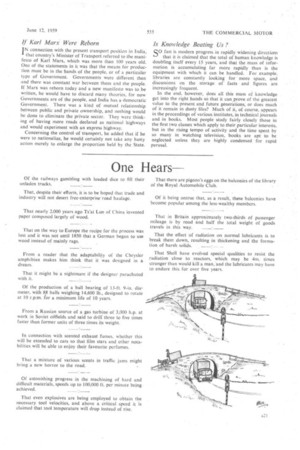One Hears
Page 23

If you've noticed an error in this article please click here to report it so we can fix it.
Of the railways gambling with loaded dice to fill their unladen trucks.
That, despite their efforts, it is to be hoped that trade and industry will not desert free-enterprise-road haulage.
That nearly 2,000 years ago Ts'ai Lun of China invented paper composed largely of wood.
That on the way to Europe the recipe for the process was lost and it was not until 1850 that a German began to use wood instead of mainly rags.
From a reader that the adaptability of the Chrysler amphibian makes him think that it was designed in a dream.
That it might be a nightmare if the designer parachuted with it
Of the production of a ball bearing of 13-ft. 9-in. diameter. with 88 balls weighing 14,600 lb., designed to rotate at 10 r.p.m. ttor a minimum life of 10 years.
From a Russian source of a gas turbine of 3,000 h.p. at work in Soviet oilfields and said to drill three to five times faster than former units of three times its weight.
In connection with scented exhaust fumes, whether this will be extended to cars so that film stars and other notabilities will be able to enjoy their favourite perfumes.
That a mixture of various scents in traffic jams might bring a new horror to the road.
Of astonishing progress in the machining of hard and difficult materials, speeds up to 100,000 ft. per minute being achieved.
That even explosives are being employed to obtain the necessary tool velocities, and above a critical speed it is claimed that tool temperature will drop instead of rise. That there are pigeon's eggs on the balconies of the library of the Royal Automobile Club.
Of it being untrue that, as a result, these balconies have become popular among the less-wealthy members.
That in Britain approximately two-thirds of passenger mileage is by road and half the total weight of goods travels in this way.
That the effect of radiation on normal lubricants is to break them down, resulting in thickening and the formation of harsh solids.
That Shell have evolved special qualities to resist the radiation close to reactors, which may be 4m. times stronger than would kill a man, and the lubricants may have to endure this for over five years.




















































































